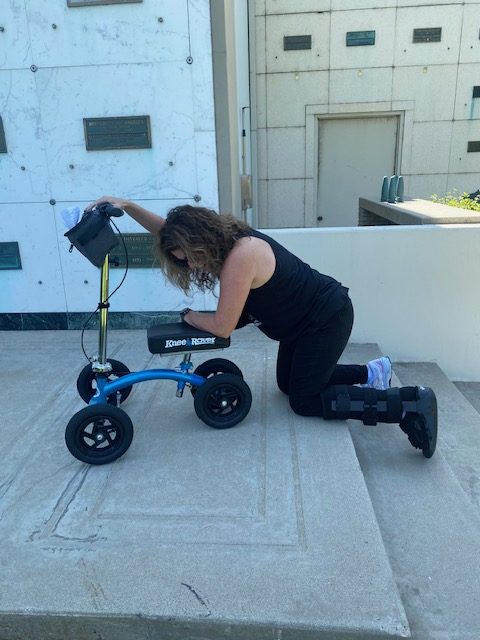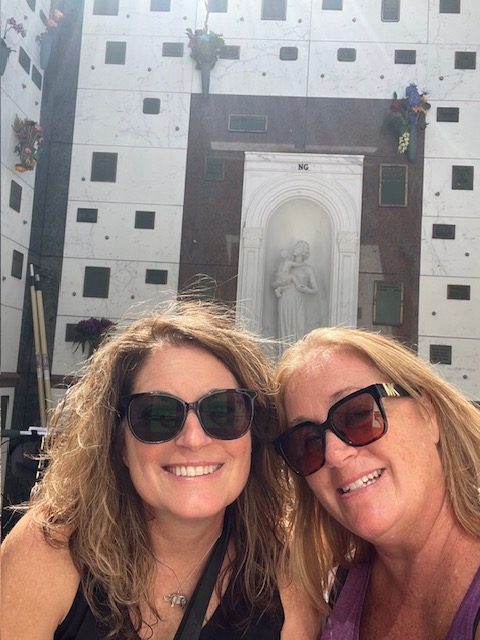Independence and Self-efficacy
Many of you are familiar with the daunting need to be independent and to feel capable of going it alone. The term Self-efficacy refers to an individual’s belief in their capacity to execute behaviors necessary to produce specific performance attainments. Essentially, it demonstrates confidence in the ability to exert control over one’s own motivation, behavior, and social environment. So what happens when something changes in one’s physical or emotional needs that confronts their Self-efficacy?
For me, and I’m sure many others, this is a lifelong learning process. Over the past 18 months I had to learn to ask for help with some things as I endured loss of mobility of one arm at a time from shoulder surgeries. I thought this was difficult…but I still had my legs and the ability to move around freely despite having only 1 arm. I adapted and managed pretty well…but during this time, I also learned that I had to ask for help when I couldn’t reach or lift something that required 2 hands.
Experiencing Dependence
Now I’m experiencing a completely different level of dependence. Being non-weight-bearing for 3 months is teaching me not only to slow down, but also that there are many things I just can’t do. Reaching for things while at the level of my scooter requires asking for help. There are places I can’t access, where my scooter won’t go. Making beds, doing laundry, and even making dinner have become extremely difficult tasks requiring me to ask for help.
I traveled this weekend alone to California, and I’m telling you, it was extremely exhausting and a struggle maneuvering through airport security, my overstuffed backpack, and getting on and off a plane. You can check a scooter at the base of a plane…but you have to either be wheeled in on a crazy chair that was too close to the trauma rescue for me, or hop. I chose to hop…but I knew I couldn’t do it with that heavy backpack so I had to ask for assistance. They offered help to get into the plane…but getting off the plane was different. It was as if they completely forgot I needed help, and once again I found myself trying to hop out of a plane, with a heavy backpack on. My final deboarding was difficult and the co-pilot of the plane looked at me and offered to help carry my bag so I could hop down the outside ramp to my scooter. Wow… everything is a challenge, and it feels so incredibly vulnerable to have to ask for help.
Greater Awareness of Disabilities
While in Burbank, my friend Michelle and I decided we wanted to visit my parents’ grave at Forest Lawn. We checked in at the gate, purchased a bouquet of flowers, and parked near the “Handicapped” sign and ramp. We thought we were golden…as we strolled up the sidewalk until the sidewalk ended, and I encountered 6 stairs with no other way up than to sit and scoot up and have my friend carry my scooter. Then we encountered yet another staircase and had to do the same. I found myself hysterically laughing with my best friend at the top of the staircase as I crawled and tried to get my body back up, with my one leg, to my scooter. Probably not the most appropriate effect at a cemetery…but part of me just had to succumb to the reality and laugh about my current circumstances. We finally made it to the top, placed the flowers at their grave, and spent some time reflecting. I’m sure my parents were laughing with us as my bestie and I embrace a lot of laughter when we’re together.

My take away from this was “If someone has limited mobility, why wouldn’t a cemetery offer an alternative option to reach their loved one’s grave without using stairs?” Wouldn’t it make sense that many people visiting deceased persons might be elderly and have additional physical limitations? I guess I need to write a letter to the cemetery and express my concerns. Yet, not ever having experienced this, I may not have even known or considered the impact of disabilities on others. Many of us just go about our daily lives, having never thought about what it might be like for persons with disabilities to participate in regular mundane activities of daily living.
It’s Okay to Ask For What You Need
I know I teach this, and also live by my word as I continue to lean into asking for what I need. It seems easier to ask for what I need emotionally after years of doing this work, and setting boundaries with people. This is usually the hardest place for the clients I work with…being able to feel okay asking for what they need from significant people in their lives. The vulnerability of feeling the ask…and also knowing you are deserving of the ask…is a process that takes practice. When we have been raised in environments that breed Fierce Independence and when clients carry messages of feeling “too much,” “needy,” or not wanting to be a “Burden” they often find themselves stuck and in a place where asking feels way too vulnerable. Yet all of these old messages can be changed and replaced with more adaptive ones.
Whether you are facing changes in your physical health through aging, trauma, or other debilitating disease processes it’s okay to lean into asking for help. Working through the emotional vulnerability and the stories you make up about what other people think is part of the recovery. If it’s a lifelong message through relational trauma, it’s important to seek help from EMDR and or IFS techniques that can get to the core of the relational trauma and help you feel capable of the vulnerability of asking for what you need now, so you can get your needs met now and in the future.


